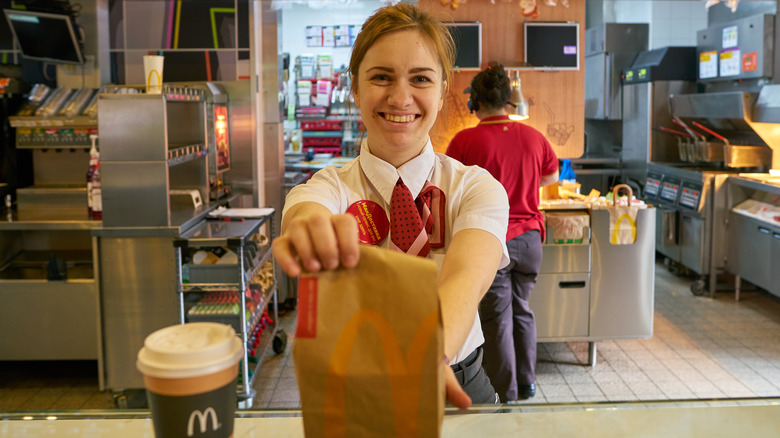McDonalds' Franchisees Are Constantly In Trouble Over Teen Work Laws
Earlier this month, the U.S. Department of Labor found evidence of multiple child labor violations at McDonald's throughout Kentucky. Multiple franchisees were reportedly employing hundreds of teenagers between the ages of 14 and 16 beyond their allowed hours. This included instances of teenagers working during school hours, and in one extreme case, two 10-year-old children were employed without pay — sometimes as late as 2 a.m. — at one franchise location.
The Labor Department's findings are by no means the first violations issued to McDonald's franchisees. Last year, the U.S. Department of Labor found that a San Diego restaurant had minors operating under hazardous conditions, and more than one hundred 14- and 15-year-olds were also found to be working well past their hourly limits in Pittsburgh area McDonald's franchises. In February 2023, franchises in Northwestern Pennsylvania were subject to $92,000 in fines for child labor law violations.
These violations are even more unsettling as state lawmakers seem to be paving the way to legalize the use of an underage workforce. States like New Jersey have recently extended the hours that children as young as 14 can work in the state during summer months. McDonald's franchises in the state were punished for teens working too many hours in 2018.
McDonald's corporation has limited liability in violations
These violations certainly stain McDonald's brand image, but the corporation is not legally liable for any of these illegal labor practices. The New York Times reports that a 2019 National Labor Relations Board judgment found that franchise owners — those who operate these restaurants and license the use of the McDonald's brand, among other resources — were liable for labor law violations. That means that while the McDonald's corporation oversees its more than 38,000 global franchise locations, it's the franchisees who are ultimately responsible for these violations.
In the case of the recent violations in Kentucky, the franchise owners are liable for the $212,544 in civil penalties. In response to these violations, McDonald's USA spokeswoman Tiffanie Boyd shared that the company sees these child labor violations as troubling. "We are committed to ensuring our franchisees have the resources they need to foster safe workplaces for all employees and maintain compliance with all labor laws," she said in a statement shared with The Associated Press.
Why is there a push to roll back child labor laws?
This recent legislation in states like New Jersey might be new, but Vox reports that it is just the most recent push to roll back such child labor restrictions. Many current bills being introduced and passed into law come from entities like the lobbying group the National Federation of Independent Businesses and conservative think-tank the Foundation for Government Accountability. These entities and the lawmakers that share their messages claim these laws are an example of government overreach that takes these decisions away from families and limits the capabilities of businesses facing labor shortages.
UNICEF points out that the use of child labor can be extremely harmful. It puts children in situations where they may face physical or mental damage and makes them vulnerable to economic exploitation, among other things. The Guardian adds that this labor takes children away from their education, which is one of the proven paths away from the poverty that has forced them to take these jobs in the first place.


